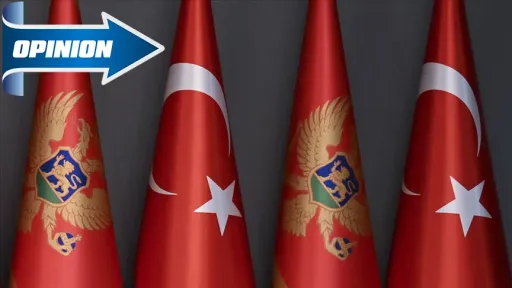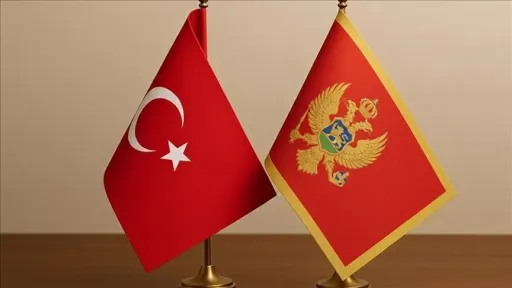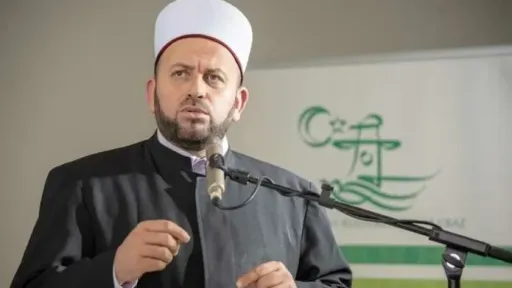Turkophobic riots test resilience of Türkiye-Montenegro ties

Following the stabbing incident in Montenegro’s capital, anti-Turkish protests broke out, shaking the Montenegrin community and reviving the faded ethnic and religious tensions in the small Balkan geography.
The chaos began in Podgorica’s Zabjelo district, where a 25-year-old Montenegrin man was claimed to have been stabbed by two Turkish individuals last week. Before investigations were concluded, local media framed the case as a "Turkish attack’’ and nationalist groups quickly mobilized online. After a couple of hours, crowds gathered outside Turkish-owned business and government buildings, chanting "Turks out’’ and ‘’Death to Turks.’’ For three consecutive nights, hundreds of demonstrators filled the streets carrying torches near the government complex.
While the tensions were escalating around the country, the Montenegrin government decided to suspend the visa-free travel arrangements with Tükiye temporarily for security reasons. Prime Minister Milojko Spajic described the measure as “an emergency decision to protect public order,” while insisting that economic ties and friendly relations with Ankara would be preserved.
Speaking to Daily Sabah, a researcher at the Foundation for Political, Economic and Social Research (SETA), Mehmet Uğur Ekinci explained that the protests after the stabbing incident can primarily be seen as an outburst of the accumulated fears and frustrations based on the Montenegrin government’s uncontrolled visa and citizenship policy to attract foreign investment and tourism, as many of the community believe.
On the other hand, Ekinci noted that the number of Turkish nationals in Montenegro remains far below that of Serbians and Russians, who are more easily accepted by the society due to cultural and linguistic similarities. Consequently, in recent years, when people in Montenegro speak of immigrants, many tend to think first of Turks.
Emphasizing that the right-wing populist and anti-immigrant movements can be observed almost everywhere in the world nowadays and a significant portion of Montenegro’s right-populist politics is rooted in Serbian nationalism, "some claim that immigration from Türkiye is part of a deliberate plan for Türkiye to 'reclaim the Balkans,' attempting to instill fear and anti-Turkish sentiment among the population. Those promoting such claims appear intent on undermining Türkiye’s growing influence and its friendly relations with Montenegro," he remarked.
The developments following a stabbing incident in Montenegro have raised questions about possible political motives behind the wave of arrests, protests, and policy shifts that have occurred lately.
Moreover, Necati Çayırlı, an expert on Balkans and lecturer at Ege University also stated, "The large-scale arrests, protests and changes in the visa regime following a single-night altercation indicate that the incident was used not merely as a criminal case but also as a political tool," highlighting that control over foreigners and visa policies is generally a political instrument employed by the governments to projects an image of strength or to convey the message of maintaining order.
Türkiye usually maintains good ties with the Balkan countries, something owed to historic connections dating back to the Ottoman dominance in the region, up until the late 19th century. Under the leadership of President Recep Tayyip Erdoğan, it adopted a more active diplomacy in the region and managed to pursue a balanced policy best exemplified by close relations with both Serbia and Kosovo, or Albania.
Ekinci also reiterated that recently, politicians and commentators from this ideological background have tended to frame the latest events in terms of Türkiye. "Within this atmosphere, narratives suggesting that Türkiye acts against Serbian interests in the region have gained traction. Indeed, some influential politicians have made statements to this effect in recent weeks," he added.
Underlining the impacts of the tensions between Türkiye and Russia on anti-Turkish narratives in Russia-linked Balkan media outlets and the rise of the “Turkophobia” in general among Serbs, "the transformation of a simple criminal case into a reactionary movement directly targeting Turks is a clear reflection of this trend,’’ he asserted.
Legal proceedings, meanwhile, undermined the initial narrative. The Podgorica High Court released the two Turkish suspects, ruling that they were at home at the time of the incident, confirmed by security cameras, and had no involvement in the assault. Yet, despite the exoneration, the protests continued, aiming to turn it into a political crisis. Foreign Minister Hakan Fidan also urged Montenegro to guarantee the safety of Turkish citizens and avoid letting provocations derail a strategic friendship.
On the occasion of the Montenegrin government’s visa decision, "it may slightly slow the positive momentum in bilateral relations, but overall, the constructive atmosphere is likely to continue,’’ Ekinci added. "The key to the future of relations will be the preservation of friendship between the two societies. In order to achieve this, Montenegro must take steps to prevent anti-Turkish provocations and to mitigate the potential social and economic harm caused by the visa decision. This would require ensuring the safety of Turks living in Montenegro," he continued.
Çayırlı also indicated that diplomatic talks between the two countries are expected to proceed in the medium term since Türkiye plays a significant role in different sectors, including Montenegro’s tourism, investment and construction. "Montenegro will likely seek to preserve the inflow of Turkish investment and tourists; therefore, a complete breakdown in relations is not expected. However, measures such as stricter entry or residence controls for Turkish citizens may come to the agenda," he underlined.
Arguing the Turkish existence in the Balkans and the perception of Türkiye right after the incident, Ekinci also highlighted that although skepticism toward Türkiye is likely to remain among Serbian nationalists from time to time, as long as Türkiye continues its constructive and inclusive policies in the Balkans, positive perceptions of Türkiye among other groups are expected to persist.
While remarking on the strong and long-established Turkish-Balkanic relations, Çayırlı noted: "If a similar incident involving Turkish nationals occurs in another country, populist politicians or media outlets may exploit it for nationalist purposes. Nevertheless, most countries in the region have vested interests in maintaining good relations with Türkiye. Due to factors such as tourism revenues, Turkish investments such as construction, energy and education, as well as military and diplomatic cooperation, it is unlikely that an anti-Turkish wave will become systematic."
By EMINE GIDER for DailySabah







